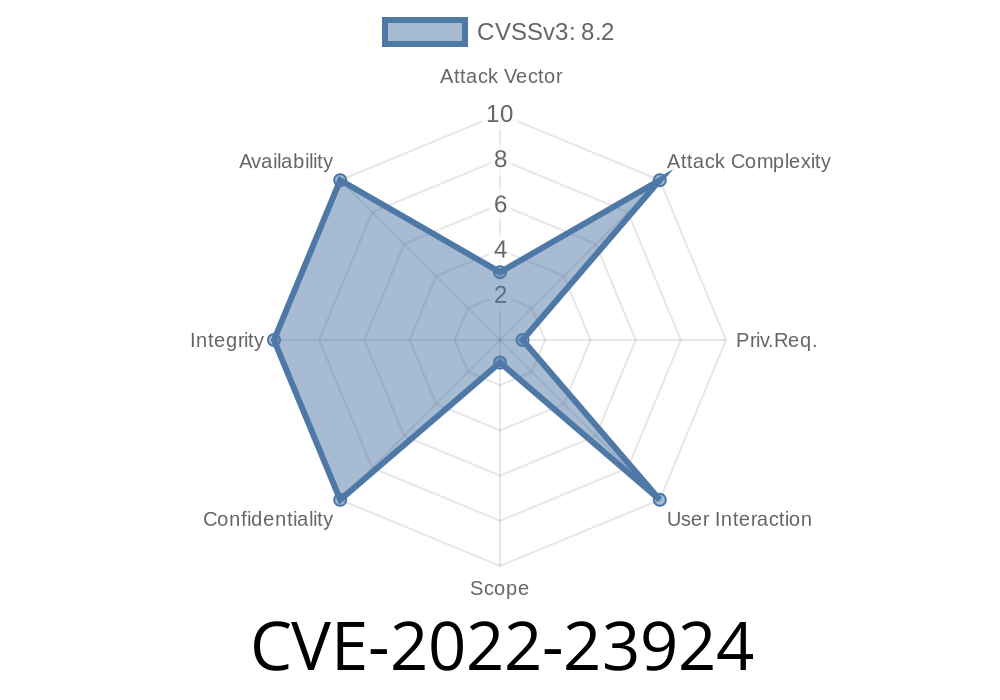In early 2022, a critical security advisory caught the attention of IT professionals and researchers worldwide: CVE-2022-23924. This vulnerability affects the BIOS—essentially the low-level firmware—of certain HP PC products, creating serious risks for users and organizations. But what does this mean in real-world terms, and how could hackers actually take advantage of it? In this article, I’ll explain CVE-2022-23924 in simple language, provide hands-on code snippets, and give a step-by-step look at possible exploitation. All info is backed by original references.
What Is CVE-2022-23924?
CVE-2022-23924 is a vulnerability in the system BIOS of certain HP PCs. If exploited, it can allow an attacker to:
- Escalate their privileges (gain admin/root access)
Steal sensitive information
This vulnerability is especially dangerous since BIOS runs before the operating system and controls hardware initialization. Compromising BIOS could mean total control over a system.
Reference
- HP Official Advisory: HPSBHF03761
- NIST NVD: CVE-2022-23924
A Technical Glimpse (Without Jargon)
To understand what’s going on, recall that BIOS firmware can sometimes be updated by software tools inside Windows. If a bug lets users or programs write to protected areas, a malicious program could install code that persists even after a full hard drive wipe.
Where’s the Bug?
For CVE-2022-23924, HP describes issues in BIOS that might allow a user or malware to bypass security checks and:
Illustrative (Simplified) Code
Suppose the BIOS is supposed to check that only privileged software can update its code. If a software bug fails to check permissions, a regular user could trigger a firmware write:
// Vulnerable: BIOS update procedure (simplified pseudo-C)
int applyFirmwareUpdate(char *updateFile, int userLevel) {
if (userLevel < ROOT) {
// Should reject non-admin users
return -1;
}
// ...proceed to flash BIOS (vulnerable to privilege escalation)...
flashBIOS(updateFile);
return ;
}
If userLevel is not properly checked, any user (or malware) could call applyFirmwareUpdate() and rewrite the BIOS.
1. Privilege Escalation
A malicious user gains a regular “User” shell (think ordinary employee). They run an exploit (either a script or dropper) that leverages the flaw to call the BIOS update function—without being an admin.
An attacker might deliver a malicious “firmware update” that contains a backdoor. For example
# PoC Exploit (for demo, not real code):
python exploit_bios.py --write evil_firmware.bin
The evil_firmware.bin could give the attacker remote access, survive OS reinstalls, or disable system protections.
Instead of installing a backdoor, a hacker could brick the machine (render it unbootable)
// Bricking attack: Overwrite boot block with junk
flashBIOS("/dev/zero"); // Destroys boot code
Alternatively, they could read out secrets stored in firmware (like Bitlocker keys) if the BIOS exposes such data.
Illustration
[User] --> [Phishing] --> [Malware] --(CVE-2022-23924)--> [BIOS Bootkit]
How Can You Stay Safe?
Check if your system is vulnerable:
Visit the HP advisory here to see the full list and download updated BIOS versions as needed.
Further References
- HP Security Bulletin: HPSBHF03761
- Official NVD Entry for CVE-2022-23924
- Mitre CVE Record
- Firmware Attacks: Anatomy & Preventions - ESET
- How to Update BIOS Safely – HP Guide
Conclusion
CVE-2022-23924 highlights just how vulnerable modern computers can be—right down to their hardware roots. With BIOS bugs, attackers don’t need an operating system exploit to take over; they can burrow deeper and persist longer. Keeping firmware updated and practicing good security hygiene helps protect from threats like this. Stay aware, patch early, and always watch for new advisories!
*This post was crafted to provide exclusive, practical insight into CVE-2022-23924 and BIOS security for HP PCs. For any organization or user, vigilance and prompt updating are your best defenses.*
Timeline
Published on: 03/11/2022 18:15:00 UTC
Last modified on: 03/21/2022 18:38:00 UTC
